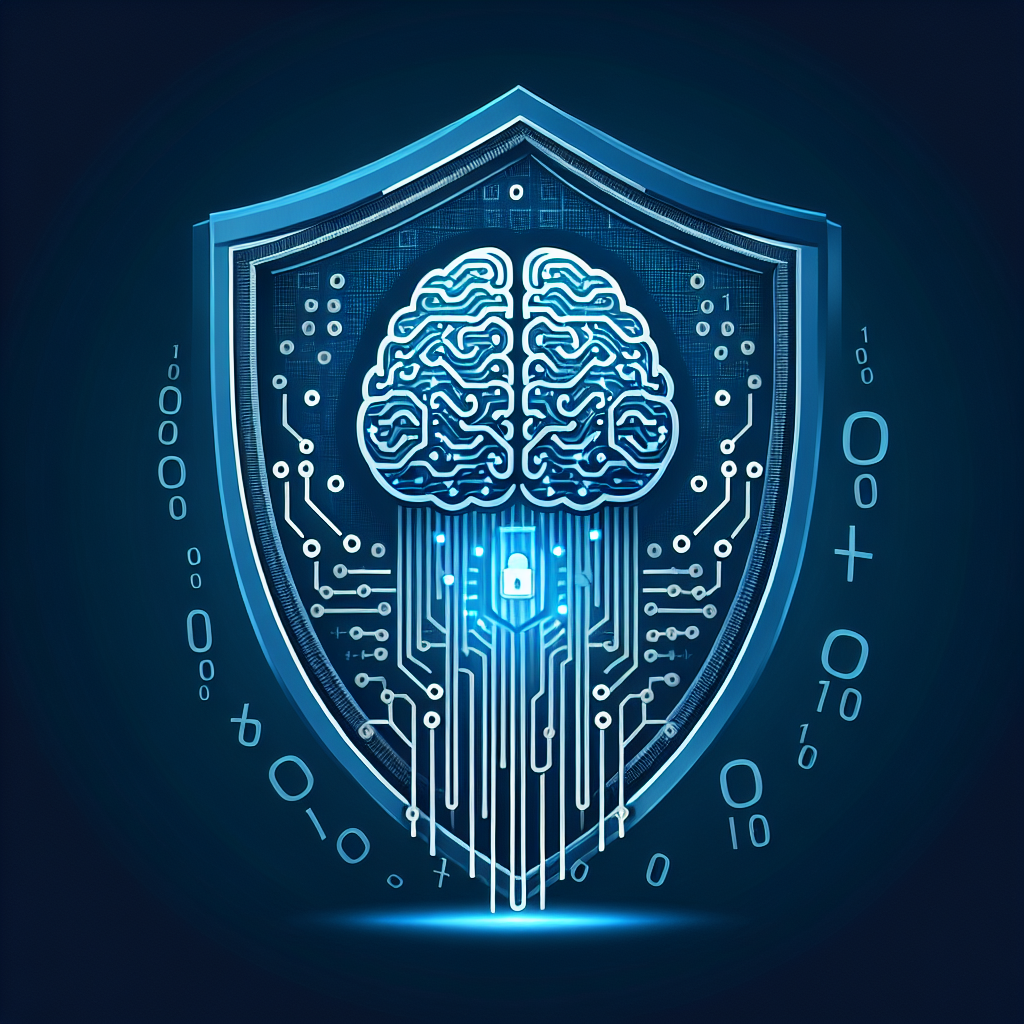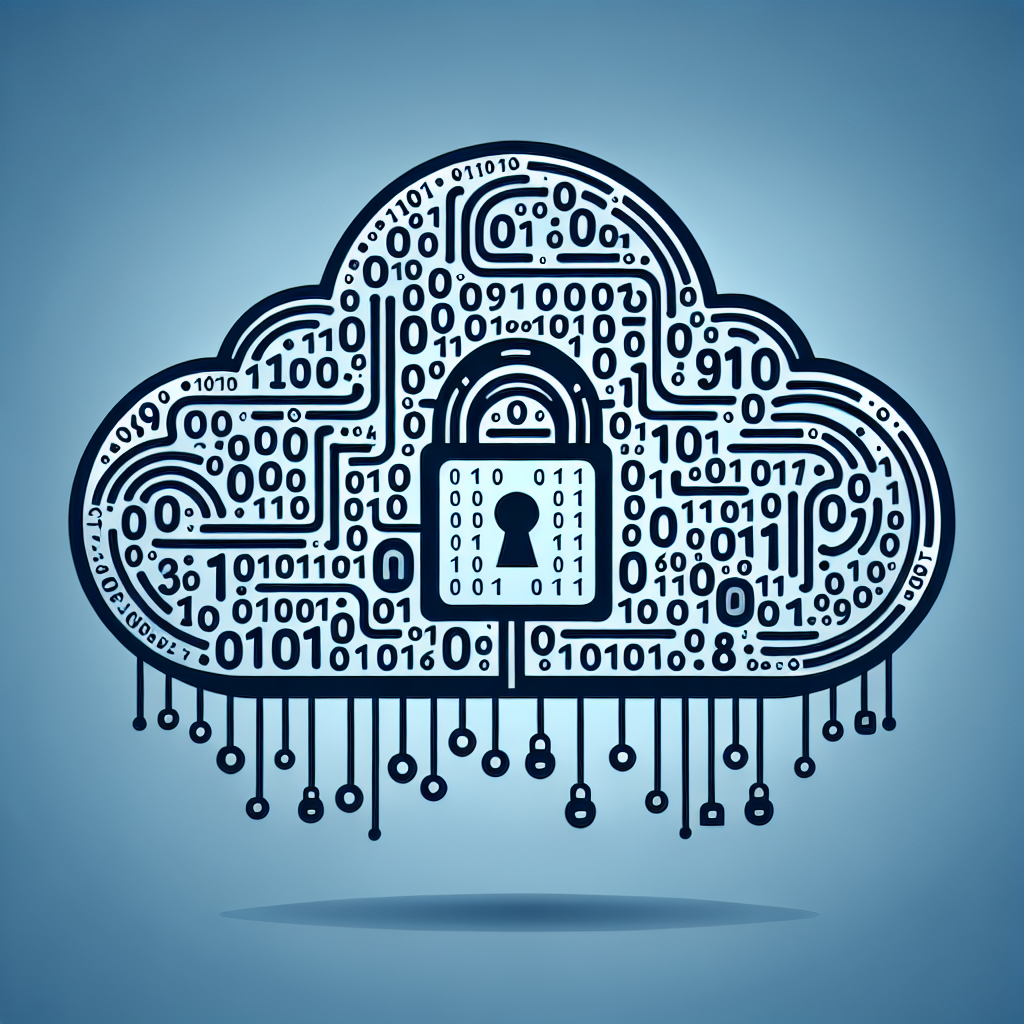Your cart is currently empty!
Tag: Protection

Security in the Cloud: Ensuring Data Protection in a Digital World
In today’s digital age, more and more companies are turning to cloud computing to store and manage their data. While the cloud offers many benefits, such as increased flexibility and scalability, it also introduces new security risks that organizations need to be aware of and address.One of the biggest concerns when it comes to cloud security is data protection. With sensitive information being stored in the cloud, organizations need to ensure that their data is secure and protected from unauthorized access. This is especially important as cyber threats continue to evolve and become more sophisticated.
To ensure data protection in the cloud, organizations need to implement a comprehensive security strategy that includes encryption, access controls, and regular monitoring of their cloud environment. Encryption is essential for securing data both in transit and at rest, making it unreadable to anyone who doesn’t have the proper encryption keys.
Access controls are also crucial for ensuring that only authorized users have access to sensitive data in the cloud. Organizations should implement strong password policies, multi-factor authentication, and role-based access controls to limit who can access certain data and what actions they can take.
Regular monitoring of the cloud environment is another key component of a strong data protection strategy. By monitoring for unusual activity or potential security threats, organizations can quickly respond to any incidents and prevent data breaches before they occur.
In addition to these technical measures, organizations should also ensure that their cloud service provider has strong security measures in place. This includes regular security audits, compliance with industry standards, and a clear understanding of the shared responsibility model, which outlines the responsibilities of both the cloud provider and the customer when it comes to security.
Overall, ensuring data protection in the cloud requires a proactive approach that combines technical measures, monitoring, and a strong partnership with a reliable cloud service provider. By taking these steps, organizations can mitigate the risks associated with cloud computing and protect their sensitive data in an increasingly digital world.

The Role of AI in Cybersecurity: Enhancing Protection in a Connected World
In today’s increasingly connected world, the importance of cybersecurity cannot be overstated. With more and more of our personal and sensitive information being stored online, the need for robust cybersecurity measures has never been more critical. As cyber threats continue to evolve and become more sophisticated, organizations are turning to artificial intelligence (AI) to enhance their cybersecurity efforts.AI has the potential to revolutionize cybersecurity by enabling organizations to detect and respond to threats in real-time. By leveraging machine learning algorithms, AI can analyze vast amounts of data and identify patterns that may indicate a potential security breach. This proactive approach to cybersecurity allows organizations to stay one step ahead of cyber attackers and respond to threats before they can cause serious damage.
One of the key benefits of AI in cybersecurity is its ability to automate repetitive tasks and streamline the security process. This not only helps organizations save time and resources, but also allows security teams to focus on more strategic initiatives. AI-powered security tools can continuously monitor network traffic, detect anomalies, and automatically respond to potential threats, all without human intervention.
Another advantage of AI in cybersecurity is its ability to adapt and learn from new threats. Traditional cybersecurity tools are often limited by their pre-defined rules and signatures, making them vulnerable to new and emerging threats. AI, on the other hand, can continuously learn from new data and adapt its algorithms to detect and respond to evolving cyber threats.
Despite its many benefits, AI in cybersecurity is not without its challenges. As AI becomes more prevalent in cybersecurity, there is a growing concern about the potential for AI-powered attacks. Cyber attackers could potentially use AI to launch more sophisticated and targeted attacks, making it even more difficult for organizations to defend against them.
To address these concerns, organizations must implement robust AI ethics and governance frameworks to ensure that AI is used responsibly and ethically in cybersecurity. This includes ensuring transparency and accountability in AI algorithms, as well as regularly monitoring and auditing AI systems to detect any potential biases or vulnerabilities.
In conclusion, AI has the potential to enhance cybersecurity in a connected world by enabling organizations to detect and respond to threats in real-time, automate repetitive tasks, and adapt to new and emerging threats. While there are challenges to overcome, the benefits of AI in cybersecurity far outweigh the risks. By leveraging AI responsibly and ethically, organizations can strengthen their cybersecurity defenses and protect their sensitive information in an increasingly digital world.

Maximizing Data Protection with Reliable Backup and Recovery Systems
In today’s digital age, data protection is more important than ever. With the increasing amount of sensitive information being stored online, businesses and individuals alike need to ensure that their data is secure and protected from potential threats.One of the key components of a strong data protection strategy is a reliable backup and recovery system. This system allows you to regularly backup your data, ensuring that even if something were to happen to your primary storage, you can easily recover your information and continue operating without any major disruptions.
There are several ways in which a reliable backup and recovery system can help maximize data protection. Firstly, it provides an extra layer of security against data loss. Whether it’s due to accidental deletion, hardware failure, or a cyber attack, having a backup of your data ensures that you can quickly restore your information and minimize any potential damage.
Furthermore, a backup and recovery system can also help protect against ransomware attacks. These types of attacks involve hackers encrypting your data and demanding a ransom for its release. With a reliable backup in place, you can simply restore your data from a previous backup and avoid paying the ransom.
Additionally, a backup and recovery system can help ensure business continuity in the event of a disaster. Whether it’s a natural disaster, a power outage, or a cyber attack, having a backup of your data means that you can quickly get back up and running without losing valuable time and resources.
When choosing a backup and recovery system, it’s important to consider factors such as frequency of backups, storage capacity, and ease of recovery. Ideally, you want a system that can automate the backup process, store your data securely, and allow for quick and easy recovery when needed.
In conclusion, maximizing data protection with a reliable backup and recovery system is essential in today’s digital landscape. By ensuring that your data is regularly backed up and easily recoverable, you can protect against data loss, ransomware attacks, and ensure business continuity in the event of a disaster. Invest in a reliable backup and recovery system today to safeguard your valuable information and keep your operations running smoothly.

The Role of IT Solutions in Cybersecurity and Data Protection
In today’s digital age, where businesses rely heavily on technology to operate, cybersecurity and data protection have become paramount concerns. With the increasing sophistication of cyber threats, organizations must implement robust IT solutions to safeguard their sensitive information from potential breaches.The role of IT solutions in cybersecurity and data protection cannot be understated. These solutions are designed to protect data from unauthorized access, ensure compliance with regulations, and mitigate risks associated with cyber threats. By leveraging advanced technologies, such as encryption, firewalls, and intrusion detection systems, organizations can establish a strong defense against cyber attacks.
One of the key aspects of IT solutions in cybersecurity is threat detection and response. With the help of advanced monitoring tools, organizations can detect and respond to potential security incidents in real-time, minimizing the impact of a breach. Additionally, IT solutions can help organizations stay ahead of emerging threats by continuously updating their security measures to address new vulnerabilities.
Data protection is another crucial aspect of IT solutions in cybersecurity. By implementing data encryption, access controls, and backup solutions, organizations can ensure the confidentiality, integrity, and availability of their data. This is particularly important for businesses that handle sensitive information, such as financial data, customer records, and intellectual property.
Furthermore, IT solutions play a vital role in regulatory compliance. With the increasing number of data protection regulations, such as the General Data Protection Regulation (GDPR) and the California Consumer Privacy Act (CCPA), organizations must implement IT solutions that help them comply with these requirements. Failure to comply with these regulations can result in hefty fines and damage to the organization’s reputation.
Overall, IT solutions are essential for protecting organizations from cyber threats and ensuring the security of their data. By investing in robust cybersecurity measures, organizations can safeguard their information assets and maintain the trust of their customers. As cyber threats continue to evolve, it is imperative for businesses to stay ahead of the curve by leveraging advanced IT solutions to enhance their cybersecurity posture.
Trump fires Rohit Chopra, Consumer Financial Protection director
PALM BEACH, Fla. (AP) — President Donald Trump has fired the director of the Consumer Financial Protection Bureau, Rohit Chopra, in the latest purge of a Biden administration holdover.
Chopra was one of the more important regulators from the previous Democratic administration who was still on the job since Trump took office on Jan. 20. Chopra’s tenure saw the removal of medical debt from credit reports and limits on overdrafts penalties, all based on the premise that the financial system could be fairer and more competitive in ways that helped consumers. But many in the financial industry viewed his actions as regulatory overreach.
In a social media post Saturday about his departure, Chopra thanked people across the country who “shared their ideas and experiences” with the government’s consumer financial watchdog agency.
“You helped us hold powerful companies & their executives accountable for breaking the law, and you made our work better,” Chopra posted above on X above pictures of his letter announcing that he would no longer lead the bureau.
During Trump’s first term, the Republican had picked Chopra as a Democratic member of the Federal Trade Commission.
In his letter, Chopra noted that the bureau was ready to work with the Trump administration. He said the agency had prepared rules to block Russia, China and others from using data brokers to surveil Americans, and had put forth policies intended to prevent people from losing access to banking services for exercising their constitutional right to express their political or religious views.
The letter noted the CFPB has also analyzed Trump’s campaign proposal to cap credit card interest rates.
Chopra was notified of his firing in an email, according to a person familiar with the notice who was not authorized to discuss the matter publicly and spoke on condition of anonymity.
Under the law, Chopra was to serve a five-year term, which meant he could have stayed on as the CFPB director. But he had publicly stated that he would leave his post if the new president asked.
In many ways, Chopra exemplified some of the tensions between Trump’s promises to curb regulations for businesses and his populist appeals to voters. When The Associated Press reported on Jan. 22 that Chopra remained in his job after Trump took the oath of office, his critics in the financial sector quickly said the president needed to dismiss him.
“The longer Director Chopra stays, the harder it will be for this pro-growth administration to undo the politically-driven, government-price setting agenda that former President Biden’s appointee has engaged in over the last several years at the Bureau,” emailed Weston Loyd, press secretary at the Consumer Bankers Association.
Chopra is an ally of Sen. Elizabeth Warren, one of Trump’s favorite targets, and the Massachusetts Democrat said in a statement that if Trump and Republicans “decide to cower to Wall Street billionaires and destroy the agency, they will have a fight on their hands.” She said the bureau under Chopra had held “Wall Street accountable.”
California Rep. Maxine Waters, the top Democrat on the House Financial Services Committee, said in a statement that Chopra’s dismissal “marks the end of an era of strong consumer protection and the beginning of a plan to end this important agency.”
The bureau was created after the 2008 financial crisis to regulate mortgages, car loans and other consumer finance. It has long been opposed by Republicans and their financial backers.
Last year, the Supreme Court rejected a challenged that could have undermined the bureau, ruling that the way it is is funded does not violate the Constitution. Unlike most federal agencies, the bureau does not rely on the annual budget process in Congress, but is funded directly by the Federal Reserve.
In a shocking turn of events, President Trump has fired Rohit Chopra, the director of the Consumer Financial Protection Bureau. Chopra, who has been a vocal advocate for consumer rights and financial transparency, was reportedly let go due to his critical stance on the administration’s deregulation efforts.Many are outraged by this decision, as Chopra’s leadership at the CFPB has been instrumental in holding financial institutions accountable for their actions and protecting consumers from predatory practices. Critics of the administration fear that his dismissal will lead to a weakening of consumer protections and an increase in financial fraud.
It remains to be seen who will replace Chopra at the helm of the CFPB, but one thing is clear – his firing has sent shockwaves through the financial industry and consumer advocacy groups alike. Stay tuned for updates on this developing story.
Tags:
- Trump administration
- Rohit Chopra
- Consumer Financial Protection
- fired
- director
- Trump fires Rohit Chopra
- government news
- financial regulation
- White House announcement
- political dismissal
#Trump #fires #Rohit #Chopra #Consumer #Financial #Protection #director

The Role of Managed Service Providers in Cybersecurity Protection
In today’s digital age, cybersecurity has become a top priority for businesses of all sizes. As cyber threats continue to evolve and become more sophisticated, companies are realizing the importance of having robust cybersecurity measures in place to protect their sensitive data and critical assets. One key player in the realm of cybersecurity protection is the Managed Service Provider (MSP).Managed Service Providers are third-party companies that offer a range of IT services, including cybersecurity solutions, to businesses. These providers have the expertise and resources to implement and manage cybersecurity measures on behalf of their clients, helping them mitigate the risks of cyber threats and data breaches.
One of the primary roles of Managed Service Providers in cybersecurity protection is to proactively monitor and detect potential security threats. MSPs use advanced tools and technologies to continuously monitor networks, systems, and applications for any signs of suspicious activity. By identifying and addressing security threats in real-time, MSPs can help businesses prevent data breaches and minimize the impact of cyber attacks.
In addition to monitoring, Managed Service Providers also play a crucial role in implementing and maintaining cybersecurity measures such as firewalls, antivirus software, and intrusion detection systems. MSPs work closely with their clients to assess their specific security needs and develop customized solutions to protect their data and assets from cyber threats.
Furthermore, Managed Service Providers provide ongoing support and maintenance to ensure that cybersecurity measures are up to date and effective. MSPs regularly update security patches, conduct security audits, and provide employee training to help businesses stay ahead of emerging cyber threats and vulnerabilities.
Another important aspect of the role of Managed Service Providers in cybersecurity protection is incident response and recovery. In the event of a data breach or cyber attack, MSPs are equipped to respond quickly and effectively to contain the damage, restore systems, and minimize downtime. MSPs can also help businesses develop and implement cybersecurity incident response plans to ensure a swift and coordinated response to security incidents.
Overall, Managed Service Providers play a critical role in cybersecurity protection by providing businesses with the expertise, resources, and support they need to defend against cyber threats and safeguard their sensitive data. By partnering with an MSP, businesses can enhance their cybersecurity posture, reduce the risk of data breaches, and achieve peace of mind knowing that their digital assets are secure.

The Role of Artificial Intelligence in Cybersecurity: A Game-Changer for Protection
As technology continues to advance at a rapid pace, so too does the threat of cyber attacks. With the increasing sophistication of hackers and their methods, traditional cybersecurity measures are no longer sufficient to protect against these evolving threats. This is where artificial intelligence (AI) comes into play.AI is quickly becoming a game-changer in the field of cybersecurity, offering a level of protection that far surpasses what humans alone can achieve. By leveraging machine learning algorithms and predictive analytics, AI can detect and respond to cyber threats in real-time, ensuring that organizations can stay one step ahead of potential attackers.
One of the key advantages of AI in cybersecurity is its ability to analyze vast amounts of data at speeds that far exceed human capabilities. This allows AI systems to quickly identify patterns and anomalies that may indicate a potential security threat, enabling organizations to take proactive measures to protect their data and systems.
Furthermore, AI can also automate routine cybersecurity tasks, such as monitoring network traffic or identifying and patching vulnerabilities, freeing up human security teams to focus on more strategic initiatives. This not only improves efficiency but also reduces the likelihood of human error, which can often be exploited by cybercriminals.
Another important role of AI in cybersecurity is its ability to adapt and learn from new threats. By continuously analyzing data and updating its algorithms, AI systems can quickly adjust to emerging threats and develop new defense strategies to protect against them. This level of adaptability is crucial in an environment where cyber threats are constantly evolving.
Despite its many benefits, AI is not without its challenges in cybersecurity. One of the main concerns is the potential for AI systems to be manipulated or compromised by malicious actors, leading to false alarms or even unintentional security breaches. To mitigate this risk, organizations must implement robust security measures to protect their AI systems and ensure that they are constantly monitored and updated.
Overall, the role of AI in cybersecurity is undeniable. By harnessing the power of machine learning and predictive analytics, organizations can significantly enhance their ability to detect, prevent, and respond to cyber threats. As the cybersecurity landscape continues to evolve, AI will undoubtedly play a crucial role in protecting against the ever-growing threat of cyber attacks.

How to Enhance Your Cybersecurity Measures for Ultimate Protection
In today’s digital world, cybersecurity is more important than ever. With cyber threats constantly evolving and becoming more sophisticated, it is crucial for individuals and businesses to enhance their cybersecurity measures to ensure ultimate protection.Here are some tips on how to enhance your cybersecurity measures:
1. Use strong, unique passwords: One of the easiest ways for cybercriminals to gain access to your sensitive information is through weak passwords. Make sure to use strong, unique passwords for all your accounts and avoid using the same password for multiple accounts.
2. Enable two-factor authentication: Two-factor authentication adds an extra layer of security to your accounts by requiring a second form of verification, such as a code sent to your phone or email. Enable two-factor authentication for all your accounts to make it harder for cybercriminals to access your information.
3. Keep your software up to date: Software updates often contain security patches that fix vulnerabilities that cybercriminals can exploit. Make sure to regularly update your operating system, antivirus software, and other applications to protect your devices from security threats.
4. Be cautious of phishing emails: Phishing emails are a common tactic used by cybercriminals to trick individuals into revealing sensitive information. Be wary of emails from unknown senders, and never click on links or download attachments from suspicious emails.
5. Use a virtual private network (VPN): A VPN encrypts your internet connection, making it more difficult for cybercriminals to intercept your data. Use a VPN, especially when connecting to public Wi-Fi networks, to protect your online activities from prying eyes.
6. Back up your data regularly: In the event of a cyber attack or data breach, having backups of your important files and data can be a lifesaver. Make sure to regularly back up your data to an external hard drive or cloud storage service to prevent losing valuable information.
7. Educate yourself and your employees: Cybersecurity is a team effort, and it is important to educate yourself and your employees about the latest security threats and best practices. Provide training on how to spot phishing emails, use secure passwords, and protect sensitive information to enhance your overall cybersecurity measures.
By following these tips and implementing strong cybersecurity measures, you can enhance your protection against cyber threats and safeguard your sensitive information. Stay vigilant, stay informed, and stay secure in the digital age.

The Role of Security in Cloud Computing: Ensuring Data Protection
Cloud computing has become an essential part of modern business operations, providing companies with the flexibility and scalability needed to thrive in today’s fast-paced digital environment. However, with the increasing reliance on cloud services, the need for robust security measures to protect sensitive data has never been more critical.The role of security in cloud computing is paramount, as it ensures that data stored on cloud servers remains safe from unauthorized access, data breaches, and cyber threats. While cloud service providers invest heavily in security measures to protect their infrastructure, it is also essential for businesses to implement their security protocols to safeguard their data effectively.
One of the key aspects of ensuring data protection in the cloud is encryption. By encrypting data before it is stored in the cloud, companies can ensure that even if unauthorized individuals access the data, they will not be able to decipher it without the encryption key. This adds an extra layer of security and ensures that sensitive information remains confidential.
Another crucial security measure in cloud computing is access control. By implementing strict access controls, companies can limit who has access to their data and ensure that only authorized personnel can view or manipulate sensitive information. This helps prevent data breaches and insider threats, which can have severe consequences for a company’s reputation and bottom line.
Regular monitoring and auditing of cloud services are also essential for ensuring data protection. By continuously monitoring cloud services for any suspicious activity or unauthorized access attempts, companies can quickly identify and respond to potential security threats before they escalate into a data breach. Auditing cloud services can also help companies identify any vulnerabilities in their security protocols and address them promptly.
In conclusion, the role of security in cloud computing is crucial for ensuring data protection and safeguarding sensitive information from cyber threats. By implementing robust security measures such as encryption, access control, and monitoring, companies can protect their data effectively and maintain the trust of their customers. It is essential for businesses to prioritize security in cloud computing to mitigate the risks associated with storing data in the cloud and ensure the continuity of their operations in today’s digital age.

Implementing IT Solutions for Cybersecurity and Data Protection
In today’s digital age, cybersecurity and data protection have become crucial aspects of every business operation. With the increasing number of cyber threats and data breaches, it is essential for organizations to implement robust IT solutions to safeguard their sensitive information and prevent unauthorized access.Implementing IT solutions for cybersecurity and data protection involves a combination of technology, policies, and procedures to defend against potential threats and ensure the confidentiality, integrity, and availability of data. Here are some key strategies to consider when implementing IT solutions for cybersecurity and data protection:
1. Network Security: One of the fundamental aspects of cybersecurity is securing the organization’s network infrastructure. This includes implementing firewalls, intrusion detection systems, and encryption technologies to protect data in transit and prevent unauthorized access to the network.
2. Endpoint Security: With the rise of remote work and mobile devices, endpoint security has become increasingly important. Organizations should implement security measures such as antivirus software, endpoint encryption, and mobile device management to protect against malware, phishing attacks, and other threats targeting endpoints.
3. Identity and Access Management: Controlling access to sensitive data is critical for data protection. Organizations should implement identity and access management solutions to manage user authentication, authorization, and permissions effectively. This helps prevent unauthorized access and insider threats.
4. Data Encryption: Encrypting data at rest and in transit is essential for protecting sensitive information from unauthorized access. Organizations should implement encryption technologies to secure data stored on servers, databases, and other storage devices, as well as data transmitted over networks.
5. Security Awareness Training: Human error is one of the leading causes of data breaches. Organizations should provide security awareness training to employees to educate them about cybersecurity best practices, such as strong password management, phishing awareness, and safe browsing habits.
6. Incident Response Plan: Despite best efforts to prevent cyber threats, organizations should also have an incident response plan in place to effectively respond to and mitigate the impact of a data breach or security incident. This includes identifying and containing the breach, conducting forensics analysis, and notifying affected parties.
7. Regular Security Audits and Monitoring: Continuous monitoring and auditing of IT systems are essential to detect and respond to potential security incidents in real-time. Organizations should conduct regular security audits, vulnerability assessments, and penetration testing to identify and address security weaknesses proactively.
In conclusion, implementing IT solutions for cybersecurity and data protection is essential for safeguarding sensitive information and maintaining the trust of customers and stakeholders. By adopting a proactive approach to cybersecurity and implementing robust security measures, organizations can mitigate the risks of cyber threats and data breaches and ensure the confidentiality, integrity, and availability of their data.
